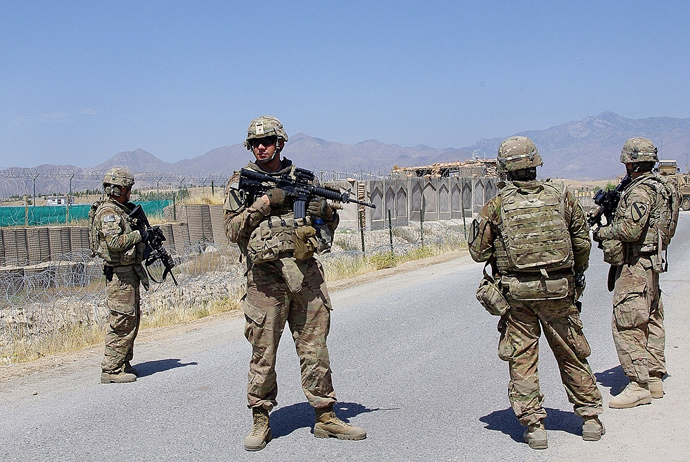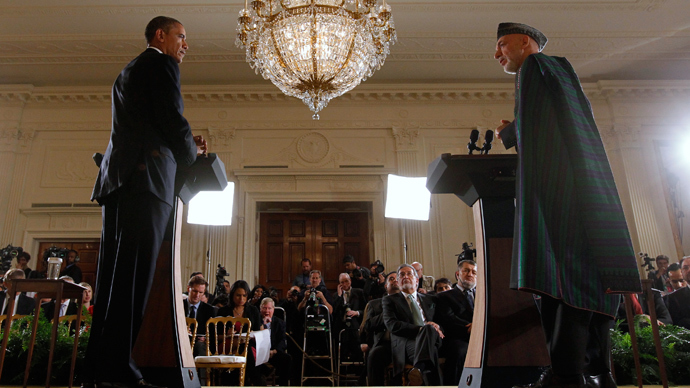The Obama administration is considering a quick ‘zero option’ withdrawal from Afghanistan after relations with the Karzai administration have degraded to a record low, the NYT reports. With no US troops left, Kabul would be left to face the Taliban alone.
Stern words between the American and Afghan presidents during a videoconference arranged to ease tensions between the countries could bring painful consequences.
For the first time ever Karzai has dared to accuse Obama to his face of conducting an unfair game.
The videoconference was organized on June 27 to get the parties’
positions closer on the matter of Taliban contacts and troop
withdrawals, but the talks ended in a bad way, the New York Times
reported, referring to American and European sources.
According to the paper’s sources among both American and Afghan officials, Karzai accused Washington of leaving its ally all alone against its enemies - the Taliban and its sponsors in Pakistan - while US diplomats attempt to negotiate safe withdrawal of the US troops from Afghanistan.
Talking to his compatriots, Karzai has already voiced such accusations before, saying that talks in Doha gave Taliban insurgents a legitimacy they have not deserved, but this time something forced him to be brutally honest with the American president.
In response, Obama pointed out to Karzai that American soldiers
have been paying with their lives to prop up the regime in the
country. Apparently the tete-a-tete may also have forced the
American leader to change his mind on the timing of a pullout
from Afghanistan.
Last month Washington started separate negotiations with Taliban in Doha, Qatar, a move Kabul regards as betrayal. Once the Karzai administration learnt about the separate talks in Doha, it immediately ended negotiations with the US over keeping some US troops in Afghanistan after official withdrawal by the end of 2014.
Karzai stressed there will be no talks until Taliban representatives contact Kabul directly, which may put the Americans in a position when they have to organize talks between Karzai and the Taliban.
"As long as the peace process is not Afghan-led, the High
Peace Council will not participate in the talks in Qatar,"
Karzai said in a statement in June, referring to a government
body he created in 2010 to seek a negotiated peace with the
Taliban.

Putting Taliban and Karzai behind a negotiating table might be a hard task for the US to pull because previously the Taliban refused to negotiate with the Karzai government, deriding it as a puppet of the United States and its NATO allies.
If previously a total withdrawal from Afghanistan ‘to the last man’, like the US did in Iraq, was regarded as a last option and was used as leverage to apply additional pressure on Karzai’s government, now it is on the table for real.
“There’s always been a zero option, but it was not seen as the
main option,” a senior Western official in Kabul told NYT.
“It is maybe now being seen as a realistic path,” the same official said, “They’re learning now, not later, when it’s going to be too late.”
However itchy to leave Afghanistan the American authorities might be, the legacy of over 10 years of war in Afghanistan would not be so easily left behind.
“Washington could potentially pull the vast majority of its troops out of Afghanistan, but given the instability of the country, it would be strange if every single solider was withdrawn, leaving various American diplomatic compounds unsecured,” political analyst Nile Bowie told RT.
There is an “underlying jab” at Karzai in Obama’s early pullout initiative, given the fact that Karzai has called for US troops to remain as a residual military training force, Bowie explained.
He pointed out that presidential elections are scheduled to take place in Afghanistan in April 2014, and the current regime “likely views American presence on the ground as a counterweight to the Taliban.”
“Either way, the vast majority occupying forces will soon depart, leaving behind a state where none of their initial goals have been realized, so it shouldn’t surprise anyone if Afghanistan in 2014 starts looking a lot like Iraq today,” Bowie concluded.
On top of all, the Afghani government remains on the US payroll and at least half of the country’s budget consists of the American funding, it is hard to imagine how President Karzai’s government is going to make ends meet while confronting Taliban.
Still, senior Afghan officials close to Karzai have already expressed their skepticism regarding full American withdrawal from the region, Reuters reports.
"Both sides understand how to pressure each other. But both the US and Afghanistan fully understand the need for foreign troops, especially US ones, to stay beyond 2014 and that it is vital for security here and in the wider region," a senior official close to Karzai told Reuters on Tuesday on condition of anonymity.
"We don't think the US will compromise on that, because past experience of abandoning Afghanistan was that the country descended into chaos," the official added, recalling the civil war in the country that followed the 1989 Soviet withdrawal.
Other Afghan politicians have dubbed the US early pullout initiative ‘propaganda’.
"The US officials saying they are considering leaving no troops behind after 2014 is just propaganda to put pressure on Afghan government so Washington can get an outcome it wants in a bilateral security pact,” former Karzai political adviser Nasrullah Stanikzai told Reuters, adding that tensions between Obama and Karzai prevent Afghan government from pursuing country’s strategic and political interests.
A senior official of the Obama administration originally told Reuters that “All options remain on the table but a decision is far from made.”
It was announced earlier that most of 63,000 American troops
would be out of Afghanistan by the end of 2014, with the first
half to leave the country by February 2014. According to the NYT,
now the Obama administration would not mind to have them all out
by summer 2014.
On Tuesday, the Pentagon clarified to Reuters that the
president has not yet decided on how many troops if any will
remain after 2014, although the option of a total pullout
remains open for consideration. Pentagon spokesperson George
Little declined to provide the media with any comment on what
recommendation Defense Secretary Chuck Hagel will make to Mr.
Obama, but White House spokesperson Jay Carney said it was
possible Obama would adopt a "zero option" that would
involve all troops leaving Afghanistan by the end of next year.
Carney said the exact number of troops left, if any, would rely
on a negotiation between the US and Afghan government.
Still it remains unclear whether the US generals would support the idea of withdrawing ahead of the schedule, taking into consideration heavy logistics and security matters.
Because the US troops make up the cornerstone of the international contingent in Afghanistan, the other participating countries are highly unlikely to keep their forces in the country once the Americans are gone.
Today the news from Afghanistan resembles a lull before a storm.
There are no major battles and operations, but foreign servicemen
continue to die regularly as Taliban insurgents continue to
attack the allied forces and Afghan
governmental residences.
Last month the US handed the security control in the country to
the Afghan national army and police force. Still, over a dozen
American troops were killed in Afghanistan in June.

